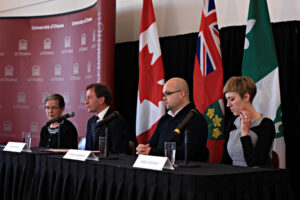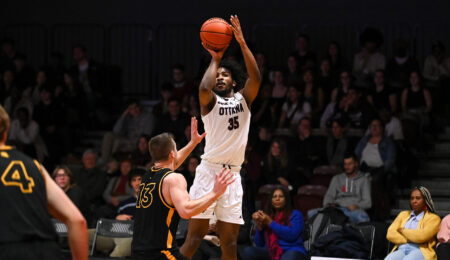Report includes Sports Services gender audit, but no code of conduct
Photos by Sabrina Nemis
Work on the recommendations from the Task Force on Respect and Equality will start before the end of this school year, the University of Ottawa announced Thursday.
On Jan. 29, after a two-month delay in which the university extended the men’s varsity hockey team’s suspension for another year, the task force released their recommendations.
The recommendations include a gender audit of Sports Services; an education initiative based on “the bystander model”; mandatory training on harassment and sexual violence for campus leadership and university-run groups; an explicit sexual violence policy; a pilot project with relevant local community organizations; having the university clarify and publicize the role of the Human Rights Office; making relevant statistical data public; funding courses to address sexual violence from an interdisciplinary perspective; a mandate that the zero-tolerance approach to sexual violence is included on every course syllabus; and the formation of an action team to oversee the implementation of all recommendations.
The university said they will adopt all of them.
The task force was created in March 2014 in response to a sexually graphic Facebook conversation posted about Student Federation of the University of Ottawa (SFUO) president Anne-Marie Roy and allegations that two members of the varsity men’s hockey team sexually assaulted a woman while in Thunder Bay to play against Lakehead University.
The task force consisted of 14 members, including undergraduate and graduate students, faculty, staff, and administration. They were mandated to make recommendations on how to promote respectful behaviour and prevent sexual violence and harassment at the university.
While Roy was invited to participate in the task force, she said she declined because she “already knew that rape culture was an issue on campus,” and did not feel that an investigation to prove its existence was necessary. She later met with the task force and recommended that students lead action on campus.
Roy said she supports what they’ve presented. “They’re certainly going to take the University of Ottawa in the right direction,” she said.
The sexual assault charges laid against Guillaume Donovan and David Foucher raised questions about the locker room culture present on the team and in varsity sports as a whole.
The task force recommends a gender audit of Sports Services, looking at whether inter-university programs reflect gender demographics on campus, and giving priority to women in hiring practices.
“Student athletes are leaders on this campus,” said task force member Kelly Gordon, stressing the importance of training on harassment and sexual violence for athletes and coaches.
Two students and two senior administrators will receive funding from the university to attend training in Vancouver in May 2015 for an education initiative based on what university president Allan Rock called “the bystander model.”
“What it does, is distribute responsibility across the whole community,” he said.
The students and administrators will be responsible for implementing the program during the academic year and the students will also be paid an honorarium for their work.
The leadership of the university will also undergo mandatory training on causes of and solutions to sexual violence before Sept. 2015. There will also be sexual harassment and violence prevention and response training available in both languages for many campus-run groups and services.
One of the biggest concerns on campus leading up to the task force’s recommendations was that a student code of conduct might be included. Students were concerned this would open potential for the administration to curb protests or facilitate sanctions for non-academic infractions.
A recent report released by the U of O ombudsperson indicates that students are already being sanctioned for non-academic behaviour.
The task force recommended explicitly against a student code of conduct, instead calling for the adoption of a prevention program, including a campus educational campaign and a sexual violence policy. Unlike a student code of conduct, these will apply not only to students, but also staff, faculty, and administration.
The university will explicitly define and promote the values they expect everyone to adhere to in relation to respect and equality on campus. Rather than evaluating behaviour on an individual basis however, the recommendation stated the values should inform existing policies, procedures, and practices on campus, and primarily be implemented through those.
The sexual violence policy will include an explicit prohibition on sexual violence; implementation of a process for investigating and disciplinary action; enumerated sanctions; as well as a website resource for related information. It also calls for “a commitment to respect the decisions and safeguard the confidentiality of those involved, as appropriate.”
An action team will oversee the implementation of all the recommendations. The members will include students, faculty, staff, and administration, as well as two task force members and a legal expert in the field of sexual violence policy. This group is intended to ensure the recommendations are not merely for show, but will result in real change on campus. Members will receive an unspecified per meeting honorarium.
Information sessions about services to be implemented will be held on campus before May of this year.
The results of the survey can be read in full here.








